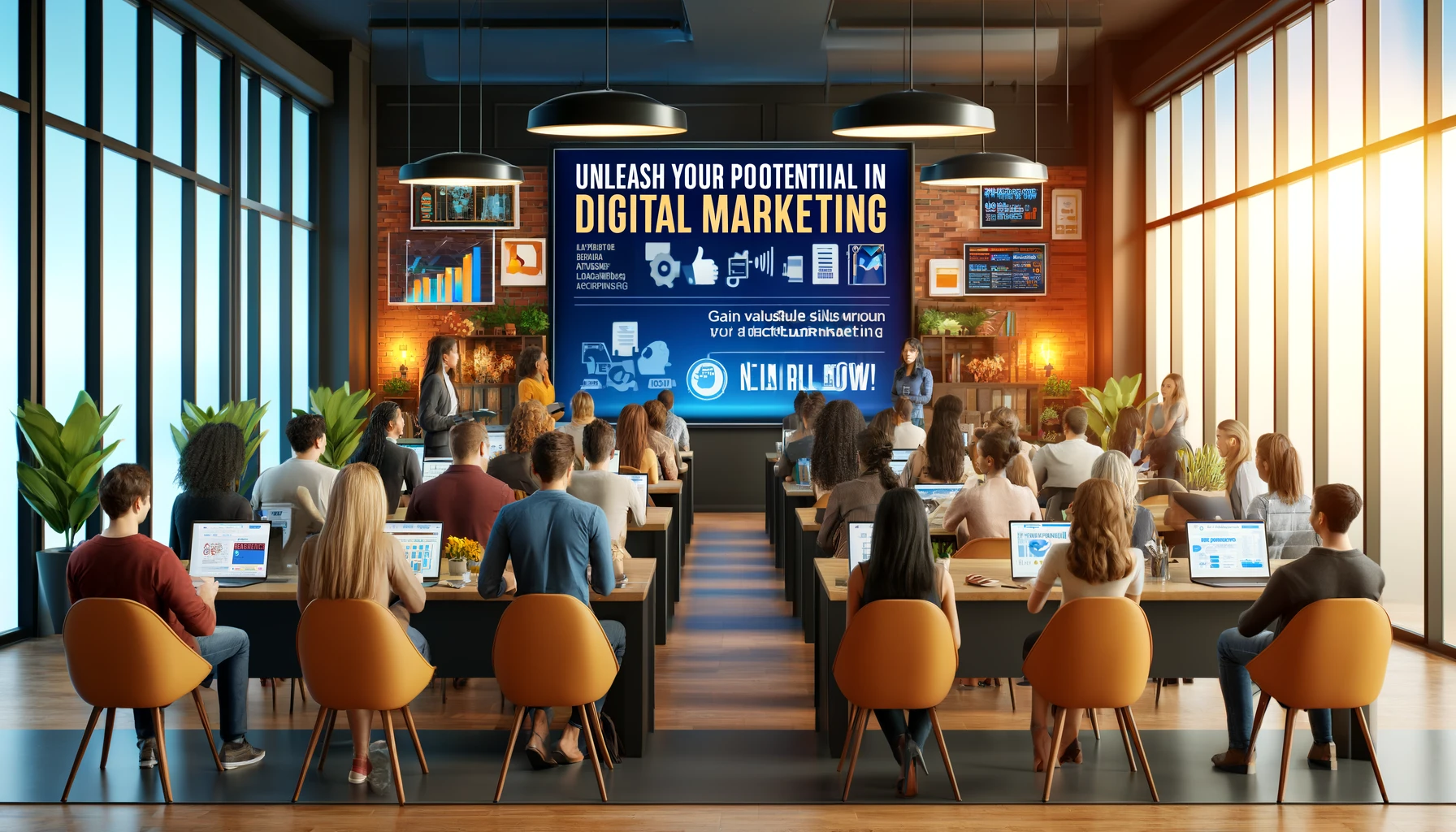4 min read
Digital Marketing Mastery: Boost Online Success with Expert Strategies!
Learn Digital Marketing: A Comprehensive Guide to Mastering the Digital LandscapeIn today's fast-paced digital world, businesses are constantly...
6 min read
![]() The Amazing Team at Focus Digital Marketing
:
Apr 30, 2024 10:49:09 AM
The Amazing Team at Focus Digital Marketing
:
Apr 30, 2024 10:49:09 AM
Digital marketing has come a long way since its inception. In the eaZarly days of the internet, marketing efforts were focused on traditional methods such as print ads, billboards, and television commercials. However, with the rise of the internet and the proliferation of digital devices, the marketing landscape has undergone a significant transformation.
The evolution of digital marketing can be traced back to the development of search engines like Google, which revolutionized the way people discover information online. This led to the emergence of search engine optimization (SEO) as a key component of digital marketing strategies. SEO involves optimizing websites and content to improve their visibility in search engine results, increasing organic traffic and driving potential customers to businesses.
Another milestone in the evolution of digital marketing was the advent of social media platforms like Facebook, Twitter, and Instagram. These platforms provided businesses with new opportunities to connect and engage with their target audience on a more personal level. Social media marketing became a powerful tool for building brand awareness, fostering customer loyalty, and driving conversions.
As technology continued to advance, digital marketing expanded to include other channels such as email marketing, content marketing, influencer marketing, and mobile marketing. These channels allowed businesses to reach their audience at different touchpoints throughout their customer journey, delivering personalized and targeted messages.
Today, digital marketing has become an integral part of every business's marketing strategy. With the increasing reliance on digital devices and the internet, businesses need to establish a strong online presence to remain competitive in the market. The evolution of digital marketing is ongoing, with new technologies and trends constantly shaping the industry.
Digital marketing refers to the use of digital channels and technologies to promote products, services, and brands. It encompasses various online marketing strategies aimed at reaching and engaging a target audience, driving website traffic, generating leads, and ultimately, converting leads into customers.
The key difference between digital marketing and traditional marketing lies in the mediums and channels used to reach the target audience. While traditional marketing relies on offline channels such as print, television, and radio, digital marketing leverages online platforms such as search engines, social media, email, websites, and mobile apps.
Digital marketing offers businesses a range of benefits, including increased visibility, targeted reach, cost-effectiveness, real-time data and analytics, measurable results, and the ability to personalize marketing messages. It allows businesses to connect with their audience in a more direct and interactive manner, fostering meaningful relationships and driving customer loyalty.
The field of digital marketing is constantly evolving, with new strategies, tools, and technologies being introduced regularly. It requires businesses to stay updated with the latest trends and best practices to effectively navigate the digital landscape and achieve their marketing goals.
Digital marketing comprises several key components that work together to create a comprehensive marketing strategy. These components include:
- Search Engine Optimization (SEO): SEO involves optimizing websites and content to improve their visibility in search engine results. It includes keyword research, on-page optimization, link building, and technical SEO.
- Content Marketing: Content marketing focuses on creating and distributing valuable, relevant, and consistent content to attract and engage a target audience. It includes blog posts, articles, videos, infographics, and social media content.
- Social Media Marketing: Social media marketing involves using social media platforms to connect with the target audience, build brand awareness, and drive engagement. It includes creating and sharing content, running ads, and engaging with followers.
- Email Marketing: Email marketing involves sending targeted emails to a specific group of people to promote products, services, or events. It is an effective way to nurture leads, build customer relationships, and drive conversions.
- Pay-Per-Click (PPC) Advertising: PPC advertising involves placing ads on search engines or websites and paying a fee each time the ad is clicked. It is a cost-effective way to drive traffic and generate leads.
- Mobile Marketing: Mobile marketing focuses on reaching the target audience on their mobile devices through SMS marketing, mobile apps, and mobile-optimized websites. It takes advantage of the growing number of mobile users.
These key components of digital marketing work together to create a cohesive and integrated marketing strategy that maximizes reach, engagement, and conversion.
Digital marketing has had a profound impact on businesses of all sizes and industries. It has transformed the way businesses reach and engage with their target audience, resulting in several key benefits:
- Increased Reach: Digital marketing allows businesses to reach a global audience, breaking geographical barriers and expanding their customer base.
- Targeted Advertising: Digital marketing enables businesses to target specific demographics, interests, and behaviors, ensuring that marketing messages reach the right people at the right time.
- Cost-Effectiveness: Compared to traditional marketing methods, digital marketing is often more cost-effective, making it accessible to businesses with limited marketing budgets.
- Real-Time Data and Analytics: Digital marketing provides businesses with real-time data and analytics, allowing them to track the performance of their marketing campaigns and make data-driven decisions.
- Personalization: Digital marketing allows businesses to personalize marketing messages based on user preferences, increasing the relevance and effectiveness of marketing efforts.
- Improved Customer Engagement: With digital marketing, businesses can engage with their audience through various channels, fostering meaningful relationships and building customer loyalty.
- Measurable Results: Unlike traditional marketing, digital marketing offers measurable results, allowing businesses to track the ROI of their marketing efforts and optimize their strategies accordingly.
Overall, digital marketing has revolutionized the way businesses market their products and services, providing them with new opportunities for growth and success.
The field of digital marketing is constantly evolving, driven by emerging technologies, changing consumer behavior, and industry trends. Some key trends and statistics in digital marketing include:
- Mobile Marketing Dominance: With the increasing use of smartphones and mobile devices, mobile marketing has become a dominant force in digital marketing. Mobile optimization, mobile apps, and SMS marketing are key strategies in reaching the mobile audience.
- Video Marketing Growth: Video marketing is on the rise, with video content becoming one of the most popular forms of online media. Businesses are leveraging platforms like YouTube, TikTok, and Instagram Reels to engage their audience through engaging and shareable video content.
- Voice Search Optimization: As voice assistants like Siri, Alexa, and Google Assistant become more prevalent, businesses are optimizing their content for voice search. Voice search optimization involves targeting long-tail keywords and providing concise, conversational answers to user queries.
- Influencer Marketing Impact: Influencer marketing has gained significant traction in recent years, with businesses collaborating with social media influencers to promote their products and services. Influencer marketing allows businesses to tap into the influencer's loyal and engaged audience.
- Artificial Intelligence (AI) Integration: AI is being integrated into various aspects of digital marketing, including chatbots, personalized recommendations, and predictive analytics. AI-powered tools help businesses automate tasks, enhance personalization, and improve customer experiences.
- Data Privacy and Compliance: With the increasing focus on data privacy, businesses need to ensure compliance with regulations like the General Data Protection Regulation (GDPR) and the California Consumer Privacy Act (CCPA). Data privacy and compliance are crucial considerations in digital marketing strategies.
These trends and statistics highlight the dynamic nature of digital marketing and the need for businesses to stay updated with the latest developments to remain competitive.
The future of digital marketing looks promising, with several growth opportunities on the horizon. Some key areas of growth and opportunities in digital marketing include:
- Artificial Intelligence and Automation: AI and automation technologies will continue to play a significant role in digital marketing. Chatbots, automated email marketing, and predictive analytics will become more prevalent, enabling businesses to streamline processes and deliver personalized experiences at scale.
- Voice and Visual Search: The rise of voice assistants and visual search technologies will shape the future of search engine optimization. Businesses will need to optimize their content for voice and visual search to maintain visibility and drive organic traffic.
- Personalization and Customer Experience: Personalization will become even more critical in digital marketing. Businesses will need to leverage data and AI technologies to deliver personalized experiences across various touchpoints, enhancing customer satisfaction and loyalty.
- Social Commerce: Social media platforms will continue to evolve as e-commerce destinations. Social commerce, where users can directly purchase products within social media apps, will become more prevalent. Businesses will need to optimize their social media presence for social commerce to capitalize on this growing trend.
- Augmented Reality (AR) and Virtual Reality (VR): AR and VR technologies will create new opportunities for immersive and interactive marketing experiences. Businesses can leverage AR and VR to provide virtual product demonstrations, enhance brand storytelling, and create unique customer experiences.
- Data-Driven Decision Making: As data continues to play a crucial role in digital marketing, businesses will need to invest in data analytics and data-driven decision-making processes. The ability to analyze and interpret data will be essential in optimizing marketing strategies and driving business growth.
These growth areas and opportunities in digital marketing highlight the importance of staying updated with emerging technologies and consumer trends. By embracing these opportunities, businesses can stay ahead of the curve and leverage digital marketing to drive success in the future.
Also Read: How to become a digital marketing specialist in a short period?
For more insights and resources on digital marketing strategies, visit Focus Digital Marketing.
FAQs:
Q1: What is digital marketing?
Digital marketing is the promotion of products or services via digital channels such as search engines, websites, social media, email, and mobile apps.
Q2: How does digital marketing differ from traditional marketing?
Digital marketing utilizes digital platforms like the internet and mobile apps, whereas traditional marketing relies on offline methods like print and television.
Q3: What are the key components of a digital marketing strategy?
Key components include search engine optimization (SEO), social media marketing, email marketing, content marketing, and pay-per-click (PPC) advertising.
Q4: Why is digital marketing important for businesses today?
Digital marketing enables businesses to reach a broader, more targeted audience more cost-effectively and measurably than traditional marketing methods.
Q5: How can digital marketing impact business growth?
Digital marketing can drive business growth by enhancing brand visibility, engaging with customers more interactively, and generating leads and conversions through targeted strategies.

4 min read
Learn Digital Marketing: A Comprehensive Guide to Mastering the Digital LandscapeIn today's fast-paced digital world, businesses are constantly...

4 min read
Explore the benefits of enrolling in a digital marketing bootcamp and the valuable skills you can gain for a successful career in the industry.

4 min read
Unlocking the Power of Digital Marketing Courses: A Comprehensive GuideIntroductionDigital marketing has become an integral part of businesses today,...